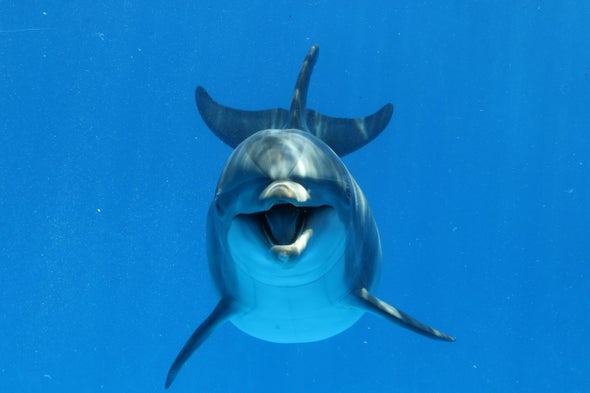(单词翻译:单击)
听力文本
This is Scientific American — 60-Second Science. I'm Christopher Intagliata.
The oceans are getting louder. And coastal areas are some of the noisiest, as in this underwater recording, captured 17 miles off the coast of Ocean City, Maryland. (CLIP: Maryland boat noise)
The noise could be a problem for marine mammals, which, like us, use sound to communicate. "Just like if we're in a noisy bar, we have to shout to each other, they might have to do that too." Helen Bailey is a marine biologist at the University of Maryland Center for Environmental Science.
She and her colleagues recorded two months of underwater sounds, in that same area off the coast of Maryland. They used automated software to fish out 200 bottlenose dolphin whistles from the noise, and visually compared the spectrograms. Here's a normal whistle sound. (whistle clip)

But what they found was that dolphins dumbed down the complexity of their whistles and raised their pitch, when they were competing with shipping noise. Like this (whistle clip 2). Which apparently helps, but could also hurt, their ability to communicate. "By using simpler calls, yes, there is a risk they're not communicating as much information as they would if it was quieter. Also for younger dolphins they actually learn these sounds from hearing other dolphins. So they're hearing this much simpler language."
The results—and a few of those spectrograms—are in the journal Biology Letters.
The survey site is the proposed future home of a wind farm — which could mean lots of noise as the huge towers are installed. Until then, it's the chronic roar of ships and boats that Bailey wants people to ponder. "I think people think about boats in terms of the emissions, just like with cars. And I think what we need to think about is sound is also an emission."
Thanks for listening for Scientific American — 60-Second Science. I'm Christopher Intagliata.
参考译文
这里是科学美国人——60秒科学。我是克里斯托弗·因塔利亚塔。
海洋环境变得越来越嘈杂。沿海地区是最喧闹的地方之一,就像这段在马里兰州大洋城沿海17英里处录制的水下录音一样。(音频片段:马里兰州的船只噪音)
噪音可能给海洋哺乳动物造成问题,因为它们和我们一样用声音进行交流。“就像在吵闹的酒吧里,我们必须彼此喊着说话一样,它们可能也不得不这样做。”马里兰大学环境科学中心的海洋生物学家海伦·贝利说到。
她和同事在马里兰州沿海同一片海域录制了两个月的水下声音。他们用自动化软件从噪音中筛选出200条宽吻海豚的哨声,并对这些哨声的声谱图进行视觉比较。以下是正常的海豚哨声。(哨声片段)
但他们发现,海豚在噪音中交流时,会降低哨声的复杂性并提高音调。(如哨声片段2)显然,这种方法很有用,但也会损害它们的交流能力。“没错,使用更简单的哨声,可能存在交流信息无法像较安静环境那样丰富的风险。这种风险也会影响年幼海豚,因为它们实际上是通过听其它海豚的声音来学习这些声音的。因此,它们听到的会是大为简化的语言。”
研究结果以及几张声谱图发表在《生物学快报》期刊上。
该研究的调查地点是一个风力发电厂的选址所在地,这可能意味着在巨型塔架安装后会产生大量噪音。在那之前,贝利希望人们仔细考虑船舶发出的长期轰鸣声。“我认为人们要考虑船舶的排放问题,就像汽车一样。我们要想到声音其实也是一种‘排放’。”
谢谢大家收听科学美国人——60秒科学。我是克里斯托弗·因塔利亚塔。
译文为可可英语翻译,未经授权请勿转载!
重点讲解
重点讲解:
1. each other 彼此;互相;
They support each other in their work.
他们在工作中互相支持。
2. fish out (从…中)取出,拿出,拖出;
Kelly fished out another beer from his cooler.
凯莉从他的冷藏箱里又拿出一瓶啤酒。
3. dumb down 降低…的难度;简化;
Universities dumb down their courses to boost pass rates, only to turn out graduates who are not much good to anyone.
大学为了鼓吹在校生的考试通过率,不惜降低课程难度,结果导致毕业生对社会百无一用。
4. in terms of 在…方面;从…角度看;根据…来说;
It can not be measured in terms of money.
这是不能用金钱衡量的。


